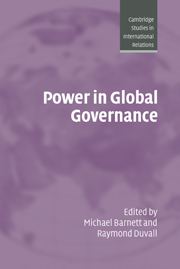Book contents
- Frontmatter
- Contents
- Notes on the contributors
- Acknowledgements
- 1 Power in global governance
- 2 Power, institutions, and the production of inequality
- 3 Policing and global governance
- 4 Power, fairness, and the global economy
- 5 Power politics and the institutionalization of international relations
- 6 Power, governance, and the WTO: a comparative institutional approach
- 7 The power of liberal international organizations
- 8 The power of interpretive communities
- 9 Class powers and the politics of global governance
- 10 Global civil society and global governmentality: or, the search for politics and the state amidst the capillaries of social power
- 11 Securing the civilian: sex and gender in the laws of war
- 12 Colonial and postcolonial global governance
- 13 Knowledge in power: the epistemic construction of global governance
- References
- Index
- CAMBRIDGE STUDIES IN INTERNATIONAL RELATIONS: 98
6 - Power, governance, and the WTO: a comparative institutional approach
Published online by Cambridge University Press: 22 September 2009
- Frontmatter
- Contents
- Notes on the contributors
- Acknowledgements
- 1 Power in global governance
- 2 Power, institutions, and the production of inequality
- 3 Policing and global governance
- 4 Power, fairness, and the global economy
- 5 Power politics and the institutionalization of international relations
- 6 Power, governance, and the WTO: a comparative institutional approach
- 7 The power of liberal international organizations
- 8 The power of interpretive communities
- 9 Class powers and the politics of global governance
- 10 Global civil society and global governmentality: or, the search for politics and the state amidst the capillaries of social power
- 11 Securing the civilian: sex and gender in the laws of war
- 12 Colonial and postcolonial global governance
- 13 Knowledge in power: the epistemic construction of global governance
- References
- Index
- CAMBRIDGE STUDIES IN INTERNATIONAL RELATIONS: 98
Summary
The World Trade Organization (WTO) is a central site for global governance. The WTO, founded in 1995, and its predecessor, the General Agreement on Tariffs and Trade (GATT), founded in 1947, are in large part products of US entrepreneurship, persuasion, and pressure, made possible by the United States' hegemonic position in world politics. The WTO institutionally constrains domestic political choices over trade and intellectual property matters, and implicitly over any regulatory policy that is trade-related, including environmental and labor policies. WTO institutional processes help spur changes in civil society and business–government relations. The WTO's detailed rules, backed by a relatively binding dispute-settlement system, implicate not only states' economic and security interests, but also state constituents' profits and norms. As a result, states and state constituents actively try to shape the WTO's agenda, its rules, their application, and their effects.
This chapter makes three central points. First, the chapter charts the myriad ways in which the United States, the European Union (EU), and influential constituents within them advance their interests through the WTO. They predominate because they wield considerable material and ideational resources that provide them with advantages in economic relations in any institutional context. Section 1 examines the various means through which these actors directly and indirectly shape and deploy WTO law and, in the process, may be constrained by it. It thus illustrates compulsory and institutional power.
Second, the chapter shows how WTO judicial bodies, as any court, exercise institutional power when they decide legal cases.
- Type
- Chapter
- Information
- Power in Global Governance , pp. 130 - 160Publisher: Cambridge University PressPrint publication year: 2004
- 4
- Cited by

